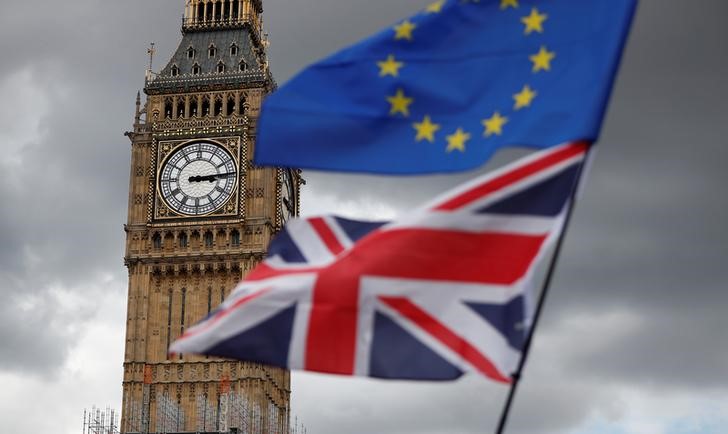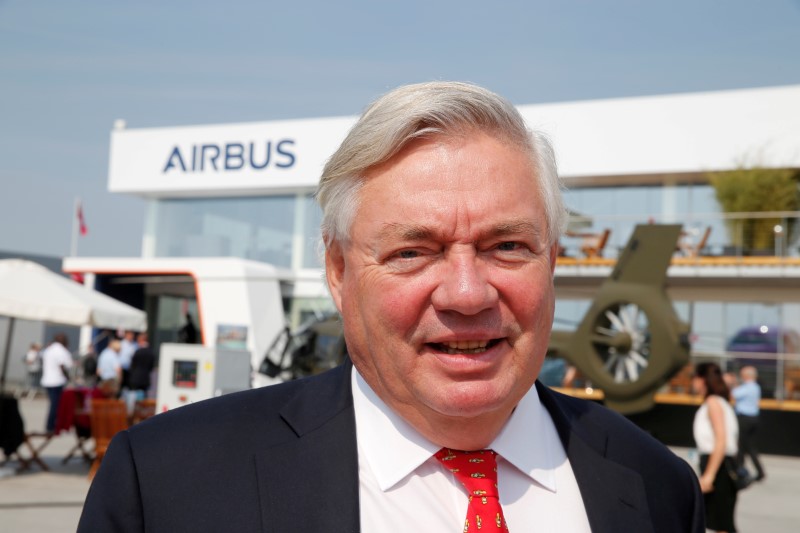
FILE PHOTO – The Union Flag and a European Union flag fly near the Elizabeth Tower, housing the Big Ben bell, during the anti-Brexit ‘People’s March for Europe’, in Parliament Square in central London, Britain September 9, 2017. REUTERS/Tolga Akmen
October 12, 2017
By Alastair Macdonald, Gabriela Baczynska and Jan Strupczewski
BRUSSELS (Reuters) – Nerves are fraying in the Brexit talks, negotiators are trying to work out if the other side is bluffing about walking away, and a ticking clock is fast narrowing British options come March 2019.
Philip Hammond, Britain’s finance minister, echoed recent EU assertions when he said that a transition period to some new relationship was a “wasting asset”, the value of which would “diminish significantly” for both sides if its form remains unclear to businesses much after the start of the new year.
As negotiators in Brussels make little progress before Prime Minister Theresa May meets EU leaders next week, a warning about a breakdown in talks from a minister seen strongly to favor a business-friendly “bespoke” transition out of the EU came a day after the EU summit chair spoke of a similar new year deadline.
Donald Tusk said on Tuesday that if London fails to settle divorce terms by December, and so unlock talks on the transition and future trade pact, then the EU would reconsider its objectives. That reflects mounting doubts across Europe that any legal exit deal can be struck.
The longer the stand-off goes on, EU negotiators said, the more Britain’s choice come March 30, 2019, will be between the “hard Brexit” by which it will simply quit all EU systems and be treated like, say, Australia, and a virtual status quo, staying in most EU systems, without voting rights, rather like Norway.
“The closer we get, the less there is to discuss about a transition and the more it just goes to a standstill transition, with Britain still in everything, but without a vote,” one said.
“Pretty soon,” said another, “It will be Norway or nothing.”
While all such commentary reflects the sides’ jockeying for negotiating advantage, the evidence this week is that they remain far apart and are getting tetchy. May and the EU traded jabs over whose court “the ball” is in after the prime minister made concessions in a speech at Florence on Sept. 22.
Behind closed doors, British negotiators voiced outraged surprise that her offer was seen as insufficient to launch talks on the future relationship. “It’s hard to say it was genuine,” one EU official said of the show of emotion. “It’s a form of pressure.”
Brexit Secretary David Davis and EU negotiator Michel Barnier are due to give a news conference around noon (1000 GMT) on Thursday to give an update on the week’s progress.
BUSINESS WORRIES
Businesses are sounding the alarm. A German industry federation warned members to start preparing for a “very hard Brexit”. A senior representative of London’s financial services industry told a Brussels audience this week that a legal transition agreement must be reached by the end of this year.
“Most importantly, it must reflect the status quo,” said Catherine McGuinness of the City of London Corporation. “There is no feasibility in asking firms to transition to a transition. If uncertainty continues, businesses will vote with their feet.”
Hammond ruled out budgeting — yet — for more customs and border facilities, and few on the continent believe threats of a walkout they say would hurt Britain more than them.
So leaders will watch May’s struggle to unite her government and sit tight. One senior EU diplomat said British counterparts were in such a weak position that “sometimes I feel sorry them”.
For many in Brussels, that makes a virtual status quo after Brexit the increasingly likely outcome: “In March 2019, Britain will formally leave,” said another EU official.
“But de facto most of the existing arrangements will remain … They will have their celebration of ‘independence’ and then we will sit down to talking business again.”
May insists a two-year transition period is enough to agree a new free trade pact, but many question that.
John Bruton, the former prime minister of Ireland, has recommended an alternative to either no deal at all or a virtual status quo transition — just keeping Britain fully in the EU for four years beyond 2019.
Arguing that the two-year deadline set by Article 50 of the EU treaty raises the risk of talks collapsing, and that agreeing first a transition and then another accord is complex, Bruton said this week that Britain and the EU should agree to a six-year negotiating period, with Britain only leaving in 2023.
Neither wants any extension. But Bruton warned: “The present tight time frame … increases the likelihood of miscalculation and of the UK leaving the EU with no deal at all.”
(Additional reporting by Luke Baker and Richard Lough in Paris and Alissa de Carbonnel in Brussels; Writing by Alastair Macdonald; Editing by Hugh Lawson)

